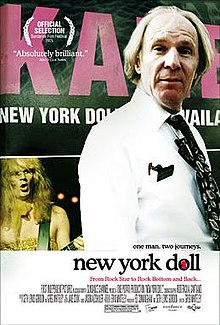New York Doll: Difference between revisions
removed Category:Documentary films about religion using HotCat |
|||
| Line 33: | Line 33: | ||
[[Category:2005 films|New York Doll]] |
[[Category:2005 films|New York Doll]] |
||
| ⚫ | |||
[[Category: |
[[Category:Documentary films about Mormonism]] |
||
[[Category:Documentary films about punk music and musicians]] |
[[Category:Documentary films about punk music and musicians]] |
||
[[Category:Portrayals of Mormons in popular media]] |
|||
[[Category:Rockumentaries]] |
[[Category:Rockumentaries]] |
||
| ⚫ | |||
[[zh:紐約娃娃]] |
[[zh:紐約娃娃]] |
||
Revision as of 16:08, 10 October 2011
| New York Doll | |
|---|---|
 | |
| Directed by | Greg Whiteley |
| Produced by | Ed Cunningham, Seth Gordon |
| Starring | Arthur Kane, David Johansen, Sylvain Sylvain |
| Music by | Brett Boyett |
| Distributed by | First Independent Pictures Vivendi Entertainment |
Release date | 2005 |
Running time | 75 min. |
| Language | English |
New York Doll is a documentary film based on the life of former New York Dolls member Arthur Kane. The film was nominated for both a Satellite Award and a Grand Jury Prize at the Sundance Film Festival, where it premiered in 2005. New York Doll was shot on digital camcorders with an aspect ratio of 1.78:1.[1][2][3]
Summary
The film details the history of both the New York Dolls and one of its members, Arthur "Killer" Kane. The film narrates the history of the band from its formation in 1972, through its drug problems and the deaths of several of its members. The central focus of the film, however, is Arthur's life after conversion to The Church of Jesus Christ of Latter-day Saints after struggles with alcoholism, drug abuse, an attempt at suicide, and a beating with a baseball bat during the Rodney King riots that left him near death, in the hospital for over a year and with a metal plate in his head[4] (the latter event is curiously not mentioned in the film). As he struggles with both loneliness and poverty, Kane discovers that he will once again have a chance to perform with the Dolls in London. After overcoming his differences with former band member David Johansen, Kane has a successful performance. Upon his return to Los Angeles, Kane contemplates touring with the reunited Dolls, but plans are cut short by his unexpected death from leukemia.
Interviews with singer Morrissey, who arranged the reunion show, appear in the film, as well as those with artists such as Chrissie Hynde and Bob Geldof.
References
- ^ DVD Talk
- ^ IGN Review
- ^ New York Times
- ^ Antonia, Nina. Too Much Too Soon Omnibus Press: 1998. ISBN:0711967776 pg 191
